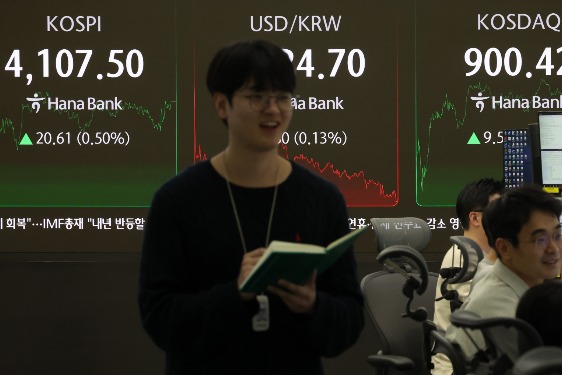Top Stories
Global Investors Turn to South Korea as Kospi Hits Record High

The South Korean stock index, the Kospi, reached a new record high of 4,107.50 on October 31, 2025, attracting significant investment from global hedge funds. Notable investors, including sovereign wealth funds and university endowments, are increasingly turning to South Korean hedge fund managers to capitalize on this remarkable performance. This surge reflects a growing belief that South Korea’s equities, long seen as undervalued, are on the verge of a breakthrough.
Heavyweight global investors are moving quickly to engage South Korean hedge funds. Early this year, Iconiq Capital, the family office managing the wealth of Mark Zuckerberg, allocated approximately 100 billion won (around $70 million) to both QUAD Investment Management and VIP Asset Management for Korean equity strategies. Following this, the Abu Dhabi Investment Authority (ADIA) invested 300 billion won in Korean assets in March. In August, American hedge fund Millennium Management directed 374.6 billion won to Billionfold Asset Management in Seoul.
The interest from American university endowments is notable, with the MIT endowment officials reportedly meeting Korean policymakers and local fund houses, including QUAD, earlier this month to explore the country’s “value-up initiative.” This initiative aims to enhance local corporate valuations, making South Korea an attractive option for long-term investments.
Growing Confidence in South Korea’s Market
The influx of capital underscores a mounting conviction among investors that South Korea’s equities are finally breaking free from their long-standing discount. The government has initiated corporate law reforms reminiscent of Japan’s past value-up campaigns, presenting a structural opportunity in the Seoul market.
Investors are optimistic about the country’s value-up agenda, which aims to address the persistent valuation gap between South Korean firms and their global counterparts. The administration of President Lee Jae Myung is actively promoting measures to mandate share cancellations following buybacks and reduce dividend tax rates, which are expected to unlock greater shareholder value.
As a result, foreign institutions are adjusting their investment strategies. Some are focusing on long-only funds that prioritize value and dividends, while others are opting for long-short strategies that aim for consistent returns. Local hedge funds are also stepping up their marketing efforts internationally to attract global partners eager to benefit from the Korean stock rally.
“Inquiries from abroad have spiked,” noted an executive at a Seoul-based asset manager. “Global investors are rushing to ask for introductions to Korean managers, suggesting that they’re under pressure to increase exposure to Korean equities quickly.”
Domestic Institutions Remain Cautious
Despite the foreign influx, South Korea’s own pension funds have been notably cautious. High-profile scandals involving Lime Asset Management and Optimus Asset Management in 2019 and 2020 resulted in substantial losses for investors, leading to tighter risk controls that have limited local institutions’ involvement with domestic hedge funds.
Industry executives argue that this cautious stance could jeopardize the opportunity for superior returns. “Even Norway’s sovereign wealth fund is entrusting capital to Korean managers like QUAD and VIP,” explained one Korean fund manager. “Yet our own public funds, such as the National Pension Service and Korea Post, continue to allocate funds exclusively to overseas hedge funds.”
As the Kospi extended its winning streak to three consecutive days, closing at a record 4,107.50, both domestic and international brokerage firms have become increasingly bullish on South Korean equities. JP Morgan recently raised its 12-month target for the Kospi to 5,000, driven by an anticipated boom in semiconductor technology and ongoing corporate governance reforms. The bank even suggested that the Kospi could potentially reach 6,000 in a full bull market.
This dynamic shift in investment patterns highlights the transformative potential of South Korea’s financial landscape, as global investors seek to leverage the newly emerging opportunities within the country’s equity markets.
-

 Lifestyle3 months ago
Lifestyle3 months agoLibraries Challenge Rising E-Book Costs Amid Growing Demand
-

 Sports3 months ago
Sports3 months agoTyreek Hill Responds to Tua Tagovailoa’s Comments on Team Dynamics
-

 Sports3 months ago
Sports3 months agoLiverpool Secures Agreement to Sign Young Striker Will Wright
-

 Lifestyle3 months ago
Lifestyle3 months agoSave Your Split Tomatoes: Expert Tips for Gardeners
-

 Lifestyle3 months ago
Lifestyle3 months agoPrincess Beatrice’s Daughter Athena Joins Siblings at London Parade
-

 World3 months ago
World3 months agoWinter Storms Lash New South Wales with Snow, Flood Risks
-

 Science3 months ago
Science3 months agoTrump Administration Moves to Repeal Key Climate Regulation
-

 Business3 months ago
Business3 months agoSoFi Technologies Shares Slip 2% Following Insider Stock Sale
-

 Science2 months ago
Science2 months agoSan Francisco Hosts Unique Contest to Identify “Performative Males”
-

 Science3 months ago
Science3 months agoNew Tool Reveals Link Between Horse Coat Condition and Parasites
-

 Sports3 months ago
Sports3 months agoElon Musk Sculpture Travels From Utah to Yosemite National Park
-

 Science3 months ago
Science3 months agoNew Study Confirms Humans Transported Stonehenge Bluestones









